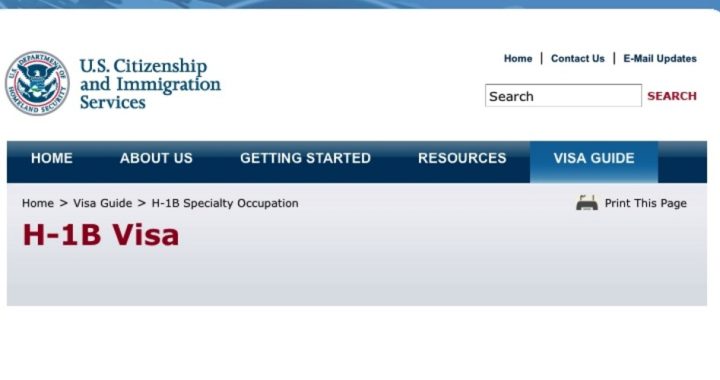
The recent surge in the polls of GOP presidential candidate Senator Ted Cruz has naturally led grassroots Republicans to inspect more closely his specific policy views. One issue of particular concern to many activists in the party is the senator’s previous strong support for the H-1B visa program, which has been touted as providing highly skilled foreign national workers for American companies that supposedly cannot find enough native-born Americans for the jobs.
Though in the past Cruz had even called for an expansion of the program, he is now advocating a freeze on legal immigration levels because labor participation rates in the United States are “below historic averages.” According to Cruz’s new plan, the government would cease issuing H-1B visas for 180 days while reported fraud and abuse in the program is investigated.
The Texas Republican has also joined the rising chorus for ending so-called birthright citizenship — the questionable interpretation of the 14th Amendment that holds that any child born on U.S. soil, even to illegal aliens, is a citizen at the time of birth.
With Donald Trump receiving continued support for his own presidential bid — largely as a result of his strong stance against illegal immigration — and with recent evidence of abuse in the H-1B program, Cruz’s switch could be both good politics and good policy.
In addition to his opposition to the H-1B program, Cruz supports building a border fence, tripling the number of Border Patrol agents, and increasing the number of deported illegal aliens. Although he has stated that he opposes amnesty, it is not certain which of the several current definitions of amnesty he means. He has not addressed whether he would legalize some of the millions of illegals already present in the country.
H-1B visas were created in 1990, with varying annual caps, as high as 195,000. Under this law, visa holders must have some specialized training or a college degree in the subject for which they are being hired. They must be paid the “prevailing wage” for the work, and they cannot legally be given a job over a qualified American worker.
Unsurprisingly, however, the law is rarely enforced. Critics of the program, such as conservative radio commentator Laura Ingraham, have contended that companies use the program not to obtain workers they otherwise could not, but rather to actually replace American workers with lower-wage foreign nationals. In one instance, Tata Consultancy Services, an India-based firm, was one of the businesses hired by Southern California Edison to outsource the work of 500 of its IT staff. Four hundred employees were simply laid off to make way for the H-1B foreign workers.
Ron Hira, professor of public policy at the Rochester Institute of Technology and the son of Indian immigrants himself, bluntly states that the visas are used not to provide workers to companies that otherwise could not find them in this country, but to (1) bring in cheaper workers; and (2) transfer American jobs to information-technology centers outside the United States.
Hira explained, “What these firms have done is exploit the loopholes in the H-1B program to bring in on-site workers to learn the jobs [of] the Americans to then ship it back offshore.” And in a further cruel twist, American workers often are forced to train their own replacements before they themselves are terminated.
East Indian Neeraj Gupta agrees with Hira’s analysis. He came to America on a student visa, and obtained a master’s degree in electrical engineering. He worked for the Indian consulting firm Patni (now called iGate), and explained that his company used the H-1B visa program to simply get rid of the native-born American employees and to hire cheaper foreign workers.
Some have even compared the H-1B workers to the indentured servants widely used in colonial America, who were bound to work for a certain employer until the contract, or indenture, expired. As it stands presently, if the H-1B employee quits his job or is fired, he must either find another employer or leave the United States. The new job must fit the qualifications of the status under which the employee was originally granted a visa, or the employee must apply for a new non-immigrant status. This, of course, gives the employer a great amount of leverage over the H-1B worker. While an employer can, of course, dismiss a native-born American or a naturalized citizen of the United States, at least he cannot cause their expulsion from the country. It is not surprising, therefore, that these foreign national workers are willing to accept lower wages than American citizens.
Microsoft’s Bill Gates is among those strongly supporting a large increase in the number of H-1B visas. His company’s intense lobbying of Congress has perpetuated the story that many American companies cannot find enough qualified workers. Gates has even stated that he would like to hire one-third more foreign workers through the program than he does presently.
Steven Camarota of the Center for Immigration Studies (which favors restrictions on immigration) challenged the notion that American industry is in desperate need of highly-skilled foreign workers. Writing in National Review, Camarota noted that the United States has more than twice the number of workers with “STEM” (Science, Technology, Engineering, and Math) degees as there are STEM jobs.
Even PBS has editorialized that these “guest workers lower U.S. wages.” Several studies back up both PBS and Camarota.
A study by the Government Accountability Office (GAO) in 2011 concluded that about 21 percent of H-1B visas are fraudulent, with deceptive practices such as a worker being employed by a company other than the one that applied for the visa.
What is driving the push for more immigration, whether through the H-1B program, or amnesty programs for illegal aliens? The Republicans who speak favorably for more immigration are generally those who support the agenda of the U.S. Chamber of Commerce, and the interests of big business. They simply want not only a cheap labor force, but a more compliant one. And, of course, Democrats insist on a “path to citizenship,” recognizing that the vast majority of immigrant workers are potential voters for their party.
Some libertarians have a philosophical reason for supporting immigration: They oppose any restraints on the “free flow of labor,” arguing that government should not stand in the way of where a person wishes to live. One prominent libertarian who differs with this view, however, is Lew Rockwell. Writing for the Mises Institute, he recently explained his opposition to open borders:
It is impossible to believe that the U.S. or Europe will be a freer place after several more decades of uninterrupted mass immigration. Given the immigration patterns that the U.S. and EU governments encourage, the long-term result will be to make the constituencies for continued government growth so large as to be practically unstoppable. Open-borders libertarians active at that time will scratch their heads and claim not to understand why their promotion of free markets is having so little success. Everybody else will know the answer.
Fortunately, the presidential race is providing evidence that the American people are not buying the open borders arguments, from whatever source. Whether Ted Cruz’s conversion on H-1B visas is sincere or political, or a bit of both, it is an encouraging sign that at least some in the presidential race are now taking the position that America must control its borders.
Steve Byas is a professor of history at Hillsdale Free Will Baptist College in Moore, Oklahoma. His new book, History’s Greatest Libels, challenges what he calls some of the great lies of history.



